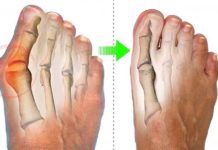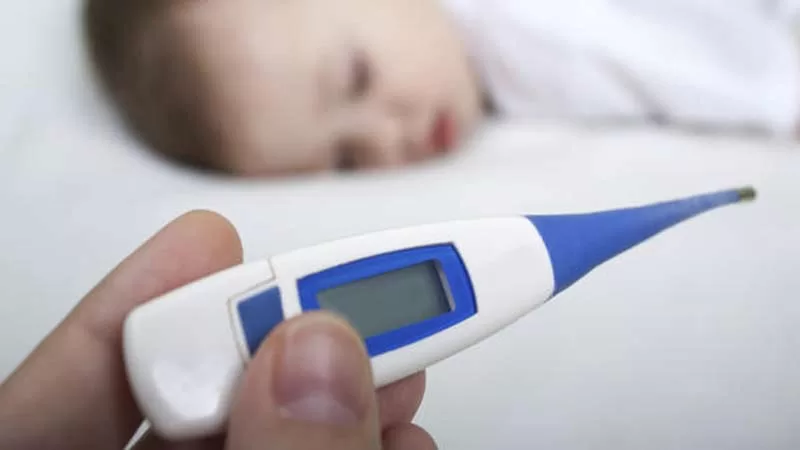Baby Fever is not a disease, but a symptom that something is not right. Therefore, it is not always necessary to eliminate it, but to have it controlled, since it indicates that the organism is reacting to the attacks of viruses and bacteria. What are the causes of fever in babies and how to treat it?
1 How can I know if my baby has a fever?
Kiss or touch his forehead.
If the notes are hotter than normal, probably your baby have a fever.
Usually, fever is a symptom that the body is fighting an infection. To confirm your suspicion, take your baby’s temperature. The pediatrician will want to know its exact temperature in order to treat it.
Most doctors and the American Academy of Pediatrics (AAP) agree that the normal body temperature of a healthy baby is between 36 and 38 degrees Celsius (97 and 100.3 degrees Fahrenheit). If your baby’s rectal temperature exceeds 38 degrees C (100.4 F), you have a fever.
2 How can I know if my baby fever is severe?
Temperature is not the only factor that indicates that a fever is serious.
Age is an important factor (fever is more worrisome in babies under 3 months), and so is their behavior (if your baby keeps playing and eating normally, a high fever may not be a cause for alarm).
Remember that the temperature of all people rises towards the end of the afternoon and beginning of the night, and falls between midnight and the first hours of the morning. That is the reason why most doctors and paediatricians receive calls related to fever towards the end of the afternoon and beginning of the night.
3 When should I call the doctor if my baby has a fever?
Nobody knows your baby better than you.
If you think you are sick and you are worried, call the doctor, whatever your temperature.
General indications
- If your baby is less than 3 months old and has a temperature of 38 degrees C (100.4 F) or higher, call the doctor immediately. Such a small baby should be examined to rule out a serious infection or illness.
- If your baby is older than 3 months , the most important thing is to look at their appearance and behavior.
If your little one behaves normally and is ingesting liquids, it is not necessary to call the doctor unless his fever persists for more than 24 hours or if it is very high.Ask the doctor to guide you a little more about when to call you.
For example, you may be recommended to call immediately if your temperature exceeds 40 degrees C (104 F), regardless of the symptoms you have.
Additional indications
The AAP recommends that you call the doctor if your child is between 3 and 6 months of age and has a temperature of 38.3 degrees C (101 F) or, if more than 6 months and a temperature of 39.4 degrees C (103 F) or plus.Contact your doctor if your baby also has the following symptoms:
- Loss of appetite
- Cough.
- Signs of an ear infection .
- Irritability.
- Drowsiness.
- Vomiting
- Diarrhea
Also call the doctor if:
- Your little one is very pale or very flushed or if he has wet less diapers than normal.
- Notes that your child has a rash and you do not know the cause. A rash may indicate a more serious problem, if accompanied by a fever. Small red-purple spots on the skin, which do not turn white or paler when pressed, or large purple spots, can be a sign of a very serious bacterial infection.
- He has trouble breathing (he makes a lot of effort to breathe or breathe faster than usual) even after wiping his nose with a rubber bulb. This could indicate that you have pneumonia or respiratory syncytial virus.
- If your baby seems sick and his temperature is lower than normal (less than 36 degrees C or 97 degrees F). Sometimes very young babies get cold instead of hot when they get sick.
4 What will the doctor do to treat my baby’s fever?
If your baby is less than 3 months old , the doctor will want you to take him to the office to examine him.
He may ask you not to give him any medicine to lower the fever until he has personally taken the temperature.
If your baby is older than 3 months , behaves normally, is swallowing fluids and does not have any other symptoms of a serious illness, the doctor may recommend waiting 24 hours before taking him to the clinic.
Because fever is often the first symptom of a disease, doctors sometimes can not find other significant symptoms when they examine a child too soon.
Depending on the level of discomfort of your baby, the doctor may recommend giving acetaminophen infant (or ibuprofen if the child is older than 6 months), to lower its temperature.
If you have symptoms that indicate a serious illness or infection, the doctor will ask you to take it to the consultation, whatever your age, or to an emergency room if you call after hours.
5 If fever is a defense against an infection, why should you try to lower it?
Since fever is part of the body’s defense against bacteria and viruses, some researchers have suggested that the body could attack infections more effectively if the temperature were high.Bacteria and viruses prefer a body temperature of 37 degrees Celsius (98.6 degrees F).
The fever also tells the body to produce more white blood cells and antibodies to fight the infection.
On the other hand, if your child’s temperature is too high, he will be too uncomfortable to eat, drink, or sleep, which will make his recovery more difficult.
If your little one’s fever is not affecting their behavior, you do not need to give anything to lower the temperature. Offer plenty of breast milk or formula to avoid dehydration, and do not overcook it when you sleep.
If your baby body temperature is higher than normal due to excess clothing or the hot day, help him cool off by taking some clothes, and encouraging him to rest or play quietly in a cool place.
6 What fever-lowering medications are safe for my baby?
If the doctor approves, you can use acetaminophen or infant ibuprofen to lower the fever (keep in mind that ibuprofen is not recommended for children under 6 months or for those suffering from dehydration or have been vomiting constantly).Be very careful when giving medicine to your baby.
Your weight will determine the correct dose. Always use the utensil (spoon, dropper or oral syringe) that comes with the medication to give you the exact amount.
Do not give medicine to reduce fever more often than recommended. The instructions probably indicate that you give acetaminophen every four hours (up to a maximum of five times per day) and ibuprofen every six hours (up to a maximum of four times a day).
Never give your baby aspirin, as it makes him more susceptible to Reye’s Syndrome, a rare but potentially life-threatening disorder.
Caution: Most doctors do not recommend combination medications for cold and cough, which are sold without a prescription. But if your little one is taking a prescribed medication, talk to the doctor before giving him any other kind of medicine, such as acetaminophen or ibuprofen. Many combination medications for cold and cough already contain ibuprofen or acetaminophen, so you run the risk of giving your child too much medicine.
7 Are there other ways to lower my child’s fever?
You can try to reduce the fever by passing a sponge with warm water (not cold) or giving a warm bath.Never try to reduce the fever by passing a sponge with alcohol.
Alcohol can be absorbed through the skin. In addition, it can also cool you down too quickly, which can eventually make your fever rise.
8 What should I do if my baby has a seizure due to high fever?
During a feverish seizure, your baby may drool or vomit.
It is also possible to roll your eyes, twist or shake your body, and get your limbs stiff. In most cases, seizures are harmless for children, although they can be scary for their parents.
If your baby is having a seizure, place it quickly on its side, away from hard objects. Gently turn your head to the side to avoid drowning if you vomit. Make sure you do not have anything in your mouth, and do not put anything in it while the seizure lasts.
During the seizure do not give your baby any medication to lower the temperature. Do not put it in cold water or give it a sponge wet by the body.
Try to record how long the seizure lasted. If it lasts more than three minutes, call your local emergency service (911 if you live in the United States or Mexico).
Even if the seizure did not last long, it is important that you tell the doctor. Also call the emergency service if your child is breathing hard, choking or turning blue.
If your baby do not have these serious symptoms, what is recommended is to carefully clean the vomit and call the doctor once the seizure is over, if it is the first time it happens to your child, no matter how long it lasted. Most likely, the doctor wants to examine you to make sure you do not have a serious infection or other problem that caused the fever.
If your baby is older than 6 months and has had seizures before, the doctor will give you more instructions on when to call if the seizure lasts less than three minutes.
9 Why did my baby’s fever go back up after it was lowered?
The medicines that lower fever have a temporary effect.
They do not affect the germ that causes the infection, so the baby may still have a fever until the infection is cured. This process can last two or three days.
Some infections, like the flu, can last between five and seven days. If you have been given antibiotics to protect against a bacterial infection, it may take 48 hours for the fever to subside.
10 My baby has a fever, but does not have any other symptoms. What happens?
When a baby has a high fever, but does not have mucus, cough, vomiting, or diarrhea, it can be hard to know what happens.There are many viral infections that cause only fever and no other symptoms.
Some of them, such as roseola, can cause three days of very high fever followed by a soft pink skin rash on the trunk.
Other more serious infections, such as meningitis, urinary tract infections, or bacteremia (bacteria in the bloodstream), can also cause high fever without presenting any other specific symptoms. If your child’s temperature is 39 degrees C (102.2 F) and persists for more than 24 hours, call the doctor, even if there are no other symptoms.













